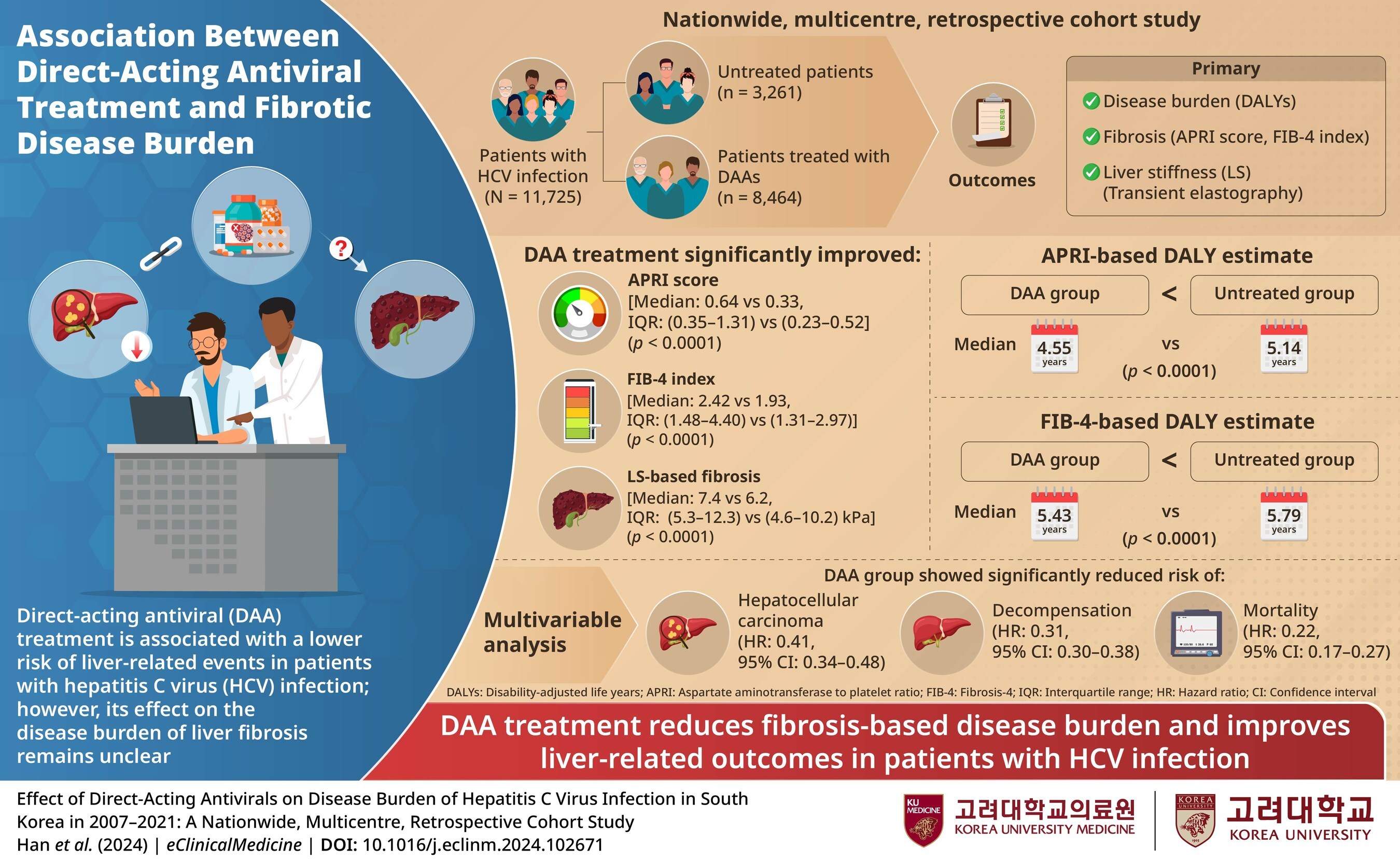Treatment with direct-acting antivirals improve liver-related clinical outcomes and reduce liver fibrosis in patients with Hepatitis C virus infection SEOUL, South Korea , Aug. 21, 2024 /PRNewswire/ -- HCV infection is the underlying cause for chronic Hepatitis C (CHC), liver cirrhosis, and liver cancer or hepatocellular carcinoma (HCC). In 2019, over 2,90,000 people died of HCV-related diseases.
Recent medical advancement made a new breakthrough treatment available for patients with hepatitis C. DAAs that block replication of HCV has dramatically transformed the treatment approach with around 90% effective anti-viral response rates. However, it is unclear whether DAAs impact the severity of disease burden caused by liver fibrosis.

To answer this critical question, Associate Professor Seungbong Han from the Department of Biostatistics, Korea University College of Medicine, South Korea collaborated with his colleagues across multiple centers in South Korea to evaluate the impact of DAAs on the fibrotic disease burden in patients with chronic HCV infection. Their study was made available online on May 30, 2024 and was published in Volume 73 of the journal eClinicalMedicine on July 1, 2024 . Sharing his vision, Associate Prof.
Han says, "For individuals, early detection and effective treatment would mean fewer complications, better health outcomes, and enhanced quality of life. Successful strategies could serve as models for other countries with high Hepatitis C prevalence, leading to global improvement in Hepatitis C management." The team collected medical records of 11,725 patients with HCV infection from 29 institutions in South Korea .
They compared individual participant data from 3,261 untreated to 8,464 patients treated with DAAs, for a follow-up period of 27.5 months. To evaluate liver disease severity and outcomes, they analyzed non-invasive reporters of liver fibrosis and stiffness, and evaluated their risk of developing liver cancer, damaged liver function, and death.
They observed that DAA treatment reduced fibrotic disease burden and lowered the risk of disease progression to cancer or cirrhosis, increasing life expectancy. The differences were most prominent in age groups 40–60 years. One of the limitations of this study is the reliance on non-invasive tests for measuring liver fibrosis.
"Noninvasive scores and liver stiffness, are not accurate for detecting reduced fibrosis after sustained viral response in patients with HCV infection because improvements in noninvasive tests typically reflect the expected reduction of necro-inflammation but not that of fibrosis," explains Associate Prof. Han. How important are liver biopsies for accurate assessment? Biopsy of the liver is the gold standard method to accurately measure and stage liver fibrosis.
However, the risks and expertise needed to perform this challenging procedure limits repeatability. Despite the limitation, this study provides scientific evidence that use of DAA is a crucial strategy for reducing liver fibrosis-based disease burden and improving clinical outcomes. Sustainability in healthcare requires evidence-based allocation of healthcare resources.
The findings from this study merits public health campaigns raising awareness about Hepatitis C and its risks that will promote nationwide screening for HCV positivity. Early intervention with advanced antiviral approaches is likely to decrease healthcare costs associated with treating advanced liver diseases like cancer or cirrhosis, freeing up resources for other critical healthcare needs. "Our study can help improve public health, healthcare systems, and individual lives by encouraging the development of early intervention and effective treatment strategies for HCV infection," concludes Associate Prof.
Han. Reference Title of original paper: Effect of direct-acting antivirals on disease burden of hepatitis C virus infection in South Korea in 2007–2021: A nationwide, multicentre, retrospective cohort study Journal: eClinicalMedicine DOI: https://doi.org/10.
1016/j.eclinm.2024.
102671 About Korea University College of Medicine Website: https://medicine.korea.ac.
kr/en/index.do Media Contact: Soo-Jin Jeon +82 2 3407 4040 [email protected] SOURCE Korea University College of Medicine.


















